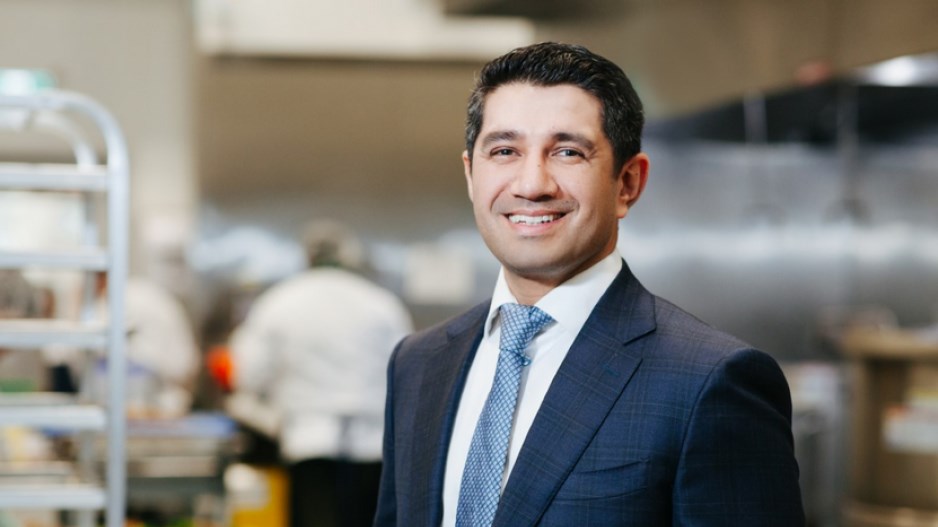It’s another busy day for Sarb Mund. The founder and CEO of Commissary Connect is training a new kitchen manager who will work across the business’ Vancouver sites.
“What we’re doing here is really a blue ocean strategy,” he says. “I mean, this has never been done before.”
Mund has created a network of commissaries –– commercial kitchen spaces –– that support local entrepreneurs by allowing them to pay for only what they need, collate their purchasing power, and export their products to broader markets.
But his innovative idea didn’t come from years of working in the restaurant industry or food supply.
“I wouldn’t be doing what I am doing today if I wasn’t a CPA,” Mund says.
Out of the classroom and into the kitchen
After receiving his CPA designation, Mund skipped straight to owning his own business.
Mund rolled into Vancouver’s burgeoning food truck scene with the Soho Road Naan Kebab food truck.
Serving up traditional UK tandoori food at the corner of Granville and Georgia, the popular take-out spot served fresh naan, butter chicken, and tandoori chicken to eager customers.
“My CPA designation gave me the tools to make a great business plan,” Mund says. “It also helped me see gaps in the marketplace.”
A CPA education provided the foundation for success
As a business owner in Vancouver’s fledgling food truck industry, Mund says his CPA designation helped him see these gaps as opportunities.
Food trucks use commissaries to prepare their food. But the commercial kitchen that Soho Road rented at the time lacked one crucial piece of equipment.
Soho Road’s vegan menu option was a spicy veggie sabji. Carrots, peas and potatoes cooked in a tomato curry sounds simple enough but the dish was causing problems.
“Because of that one [menu] item, we had to jump from a commercial kitchen that didn’t have that spec, to a kitchen that was really expensive,” he says. “Our rent probably tripled at that time, just for that one item.”
At the time, commissaries had no way of metering off pieces of equipment. Businesses had to pay for access to an entire kitchen even if they only wanted to use one piece of equipment.
Mund’s solution was Commissary Connect. His business would give local entrepreneurs access to state-of-the-art equipment, kitchens, and office space in a supportive environment, and owners could save money by paying only for what they used.
“It was a given to me that if there was a lack of something, we should build it and then make it better,” says Mund.
With the success of his food truck, Mund was able to start Commissary Connect without external investors. Even before breaking ground on their first site, his team was designing and patenting technology to monitor cook site usage and bill per hour, per piece of equipment.
Mund has had scalability in mind since day one.
“A situational analysis is running in the back of my mind all the time,” says Mund. “Being able to understand our strengths and weaknesses, threats and opportunities.”
One innovation led to another. One site expanded to two. They soon realized that their clients using Commissary Connect kitchens were ordering the same supplies, so they moved to collate purchasing.
From local eatery to provincial change
Commissary Connect’s third site is also the first provincial food hub and the pilot demonstration site for the regional food hub system –– a concept that Mund says is a game-changer for the local economy.
Regional food hubs support farmers and small processors just starting out and help existing businesses expand their products and develop new markets. Mund says he’s proud of how the idea for Commissary Connect has grown into something with a much bigger impact.
“To create a structure that’s going to help get more local jobs, help reinvigorate the economies of rural towns, connect all of our resources together,” says Mund. “This is really cool.”
The owner of the food truck at the corner of Granville and Georgia is now working with the Minister of Agriculture to change the structure of provincial food production and distribution. Mund says the CPA helped him see gaps in the industry and understand that they needed to be filled. Working with startups now, he says there’s one big difference between food businesses created by CPAs.
“They’re always thinking scale, they always have an understanding of the fundamentals of business,” he says. “That is something that I feel that I would not have had without the CPA.”




